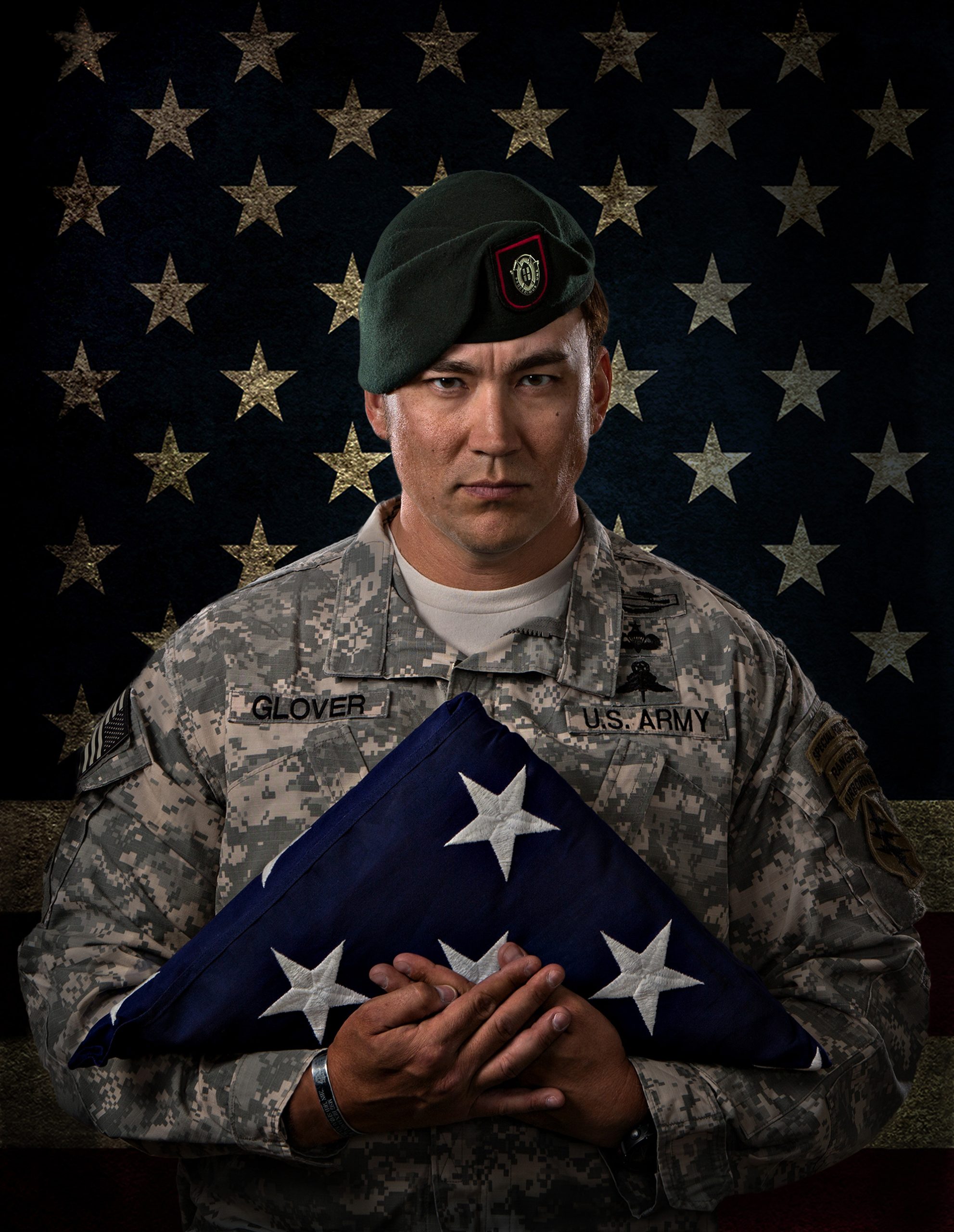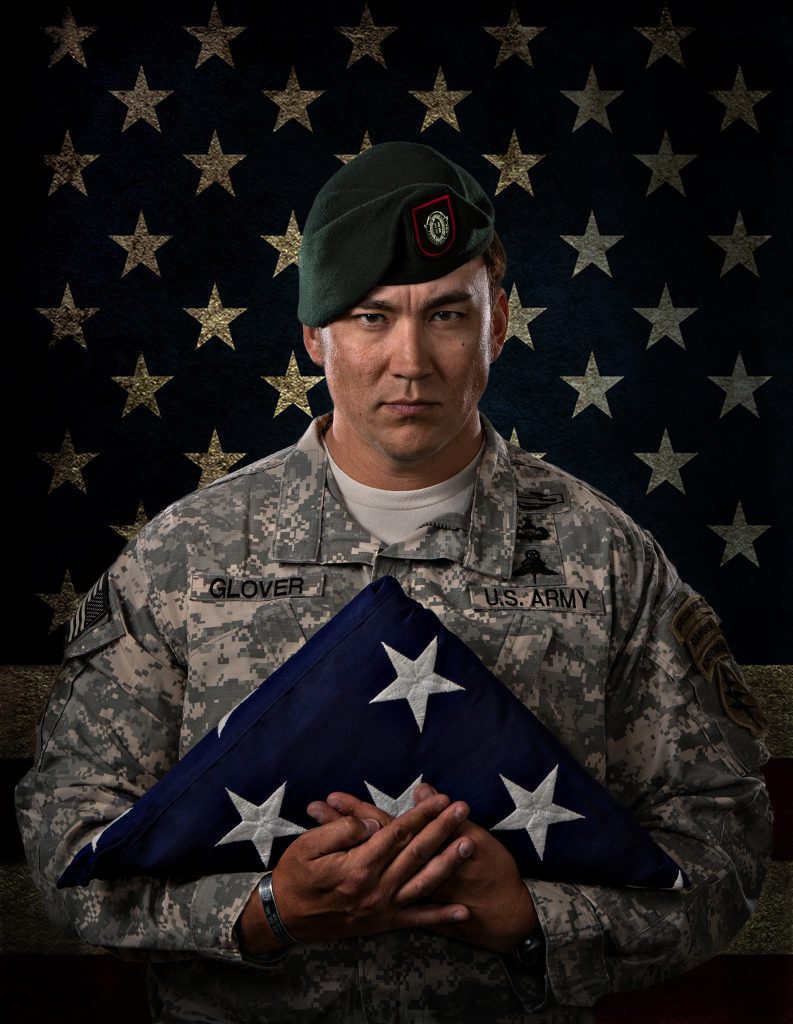
Sgt. Maj. Michael Glover
- Fact: To go here...
- Fact: To go here...
- Fact: To go here...
Written by Sue Tone
From the Army’s perspective, there’s no difference between a Green Beret and a member of the Special Forces, said U.S. Army Special Forces Sgt. Maj. Michael Glover, (ret.).
Glover, a Prescott resident, delved more deeply into the details as he talked recently about his life and military experience.
“If you are in Special Operations, you could be an ‘Army Ranger.’ You could be a U.S. Army Special Forces ‘Green Beret.’ You could be a member of Special Forces ‘Aviation Regiment,’” he said. “Special Forces, which is a tab, is inclusive to the Green Beret. Special Operations Forces, is part of Special Forces Command, which includes Navy Seals, Marine Special Operation Command, and Green Beret.”
Glover knew from an early age he wanted to join the military. His father served in the Army and an uncle in the U.S. Navy. At age 17, Glover chose the Army life because, he said, “I wasn’t a very good swimmer and I didn’t want to mop the deck.”
For short periods of time he lived in Daytona Beach, Florida, and stationed with his father in Germany. His teenage years were spent in North Carolina. He dropped out of high school at 15 or 16, then took a rapid course to obtain his diploma, and graduated after he entered the Army. His mother, a Korean immigrant, graduated high school at the same time, Glover said with pride. While deployed, he earned a bachelor’s degree in Homeland Security from American Public University.
Glover spent 20 years in the Army, first going into the Third Infantry regiment in 1997, and earning his ranks as he gained experience. He credits his “street smarts” and his desire to be a fighter as contributing to his leadership abilities.
He served as a guard at the Tomb of the Unknown Soldier in Arlington National Cemetery for nine months before attending the Airborne and Ranger schools.
After four years, and with lots of training under his belt and no opportunity to use it, Glover got out of the Army on Sept. 3, 2001. “A week later, 9/11 happened. I immediately did everything I could to get back in,” Glover said, adding that, once back on active duty, he tried out for Special Forces. “I’ve been to war eight times. I’ve been to many countries – Iraq five times, Afghanistan twice, Libya and Niger.”

Something he always wanted to be, was a sniper. “It was all I aspired to be,” he said. “It took a decade to get the opportunity to go to sniper school. But when I went, I took that school very seriously.”
Earning his Special Forces sniper identifier was “the biggest, most significant accomplishment in training I’ve ever done in the military,” Glover said. The designation is not just a sniper qualification; it means it is one’s job, living the life of a sniper.
He credits his extensive training for his ability to survive difficult situations in combat and also for managing stress in daily life. Undergoing stressful situations during training exercises prepares one for the reality of combat situations and increases the likelihood of effective missions.
“It sets you up for success,” he said. “You realize, when you get to war, you realize war is not all that bad after you’ve trained so hard.”
Glover described one incident where he and his men were under fire in a third-story building while watching over a hostage rescue situation. “It was the first time in combat I felt like I might not make it out of that. I remember telling myself to remain cool, calm, collected so that I could get these young men, these young Army privates, out of this bad situation.”
He was able to communicate with an Air Force F-16 fighter pilot who helped by coming out of his protocol air flight and elevation speed, probably at 10,000 feet, Glover said. “And he dropped out of the sky in broad daylight, and he dropped down to 500 feet and flew over us. As he flew over us, he popped his flares.”
This show of force, “little ignited fireballs” that rained down, allowed Glover and his men to get to their vehicles and escape to safety. “Without that pilot, who I never identified, without him I probably wouldn’t have survived that,” he said.
On another mission while in Iraq, Glover and his men infiltrated an area to search for foreign enemies. He was working with a military dog, a Belgian Malinois named Vinnie. “He saved my life. He bit a suicide bomber about 20 yards in front of me that I was literally standing over only minutes before,” Glover said. “I was able to back up. Fortunately, the terrorist that was in the grass didn’t hear me. I backed off. Vinnie came forward and bit the suicide bomber. I hope he bit him well. The suicide bomber killed himself and killed Vinnie at the same time.”
Glover said one of the best things about serving in the military is the friends he has made. “I think the friendships that you make you’ll carry with you forever,” he said.
Glover owns his own company, Fieldcraft Survival, which provides training in self-defense, medical and mobility skills, and offers equipment for managing worst-case scenarios.
Today, he tells youth that service to one’s country in any way is worth it. “I’m proud to be a veteran, to belong to a small group of Americans that have served. And I would say it’s always worth it.”
